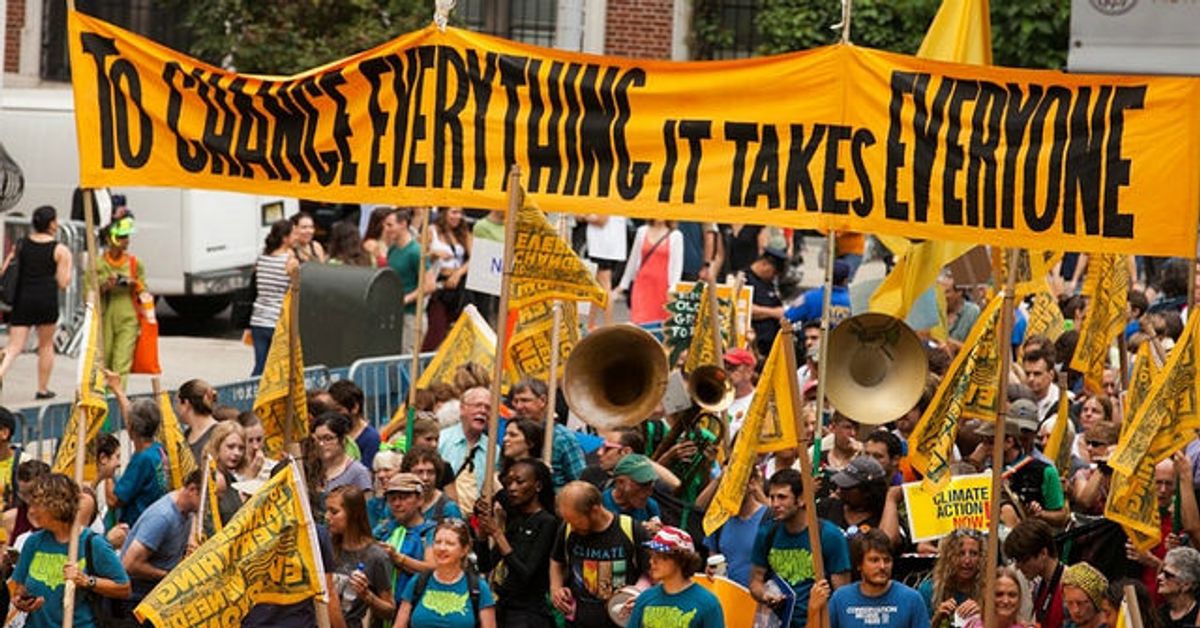The fallout continues from the Vatican's encyclical on climate change, Laudato Si', as hordes of commenters strive find their own angle of attack. This week New York Times columnist David Brooks found his.
Moral realists, including Catholic ones, should be able to worship and emulate a God of perfect love and still appreciate systems, like democracy and capitalism, that harness self-interest. But Francis doesn’t seem to have practical strategies for a fallen world.
The practical strategy Brooks is interested in is development, both economic and technological. He cites a 2008 article from The Economist on the Environmental Sustainability Index (also called the Environmental Performance Index), which he says shows that, "nations with higher income per capita had better environmental ratings. As countries get richer they invest to tackle environmental problems that directly kill human beings (though they don’t necessarily tackle problems that despoil the natural commons)."
Brooks' argument is a familiar one and compelling to many, not least the leaders of rapidly developing nations such as China, India and Brazil who have often expressed distaste at being asked by already-wealthy nations to rein in their economic development. Brooks also castigates the encyclical for its hard skepticism about the worth of technology and development to solve the world's numerous problems:
110. The fragmentation of knowledge proves helpful for concrete applications, and yet it often leads to a loss of appreciation for the whole, for the relationships between things, and for the broader horizon, which then becomes irrelevant. This very fact makes it hard to find adequate ways of solving the more complex problems of today's world, particularly those regarding the environment and the poor ... A science which would offer solutions to the great issues would necessarily have to take into account the data generated by other fields of knowledge, including philosophy and social ethics.
Brooks uses the example of fracking, but we might also look to future technologies such as giant wind turbines or cheaper solar panels, advanced nuclear reactors, or even fusion power to counter global warming. While offering Pope Francis praise as "a truly good person", Brooks asserts that if we'd listened to those like him, Asia would never have experienced its economic miracle and America would not be going through an energy revolution founded on advanced technologies. "Over the long haul both people and nature are better off with technological progress, growth and regulated affluence."
Brooks may however be slightly misreading the Environmental Performance Index, which isn't a ranking of how much money countries are spending on the environment but analyzes how well different countries are achieving certain goals. The 2008 report focused on two environmental objectives: "reducing environmental stresses to human health" and "promoting ecosystem vitality and sound natural resource management." Its conclusion was that more money does not necessarily equal a better environment. At every level of wealth, some nations did better and others lagged behind. "Statistical analysis suggests that in many cases good governance contributes to better environmental outcomes." The Economist asked,
Of course it is no surprise that Switzerland fares better than Niger. But why is the poor Dominican Republic much healthier and greener than nearby Haiti? Or Costa Rica so far ahead of Nicaragua, whose nature and resources are broadly similar? And why is wealthy Belgium the sick man of western Europe, with an environmental record worse than that of many developing countries?
If David Brooks had waited one more day to write his column, he might have read "Health and Climate Change", published by the medical journal The Lancet. Reading like a drum banging to summon the tribe, the report urges the world's health professionals to unite and tackle climate change, and in particular rising emissions ("A healthy patient cannot continue with indefinitely rising levels of a toxin in the blood.")
Health professionals have worked to protect against health threats, such as tobacco, HIV/AIDS, and polio, and have often confronted powerful entrenched interests in doing so. Likewise, they must be leaders in responding to the health threat of climate change. A public health perspective has the potential to unite all actors behind a common cause—the health and wellbeing of our families, communities, and countries. These concepts are far more tangible and visceral than tonnes of atmospheric CO2, and are understood and prioritised across all populations irrespective of culture or development status.
The next thirty pages make for sobering reading, as the authors (all 45 of them) lay on the table all the ways that climate change is going to kill us, from coal particulates in our lungs to food insecurity, mass migration and violence. We'll all suffer, but some will suffer more: "The poorest people are also most vulnerable to climate change, meaning that the costs of global development will rise if we do nothing, and poverty alleviation and sustainable development goals will not be achieved." It ends, however, by explaining that nothing is needed to prevent or mitigate these disasters except the will to do so.
One conclusion evident throughout our report is that much of the technical expertise, technology, and finance required to turn climate change from a public health threat into an opportunity is readily available, but politically restricted. In essence, whether we respond to “the biggest global health threat of the 21st century” is no longer a technical or economic question—it is political.
Are they correct? Do we have everything we need to prevent the worst, except for the will to carry through? Or is the problem too big, and do we need more resources, more technology, and more development? Let us know in the comments below!

Shares